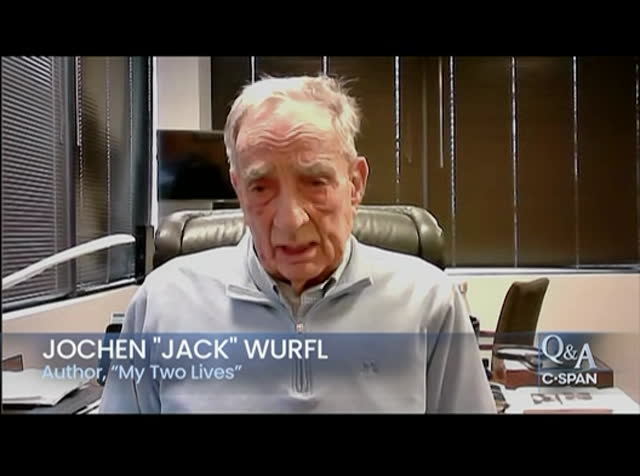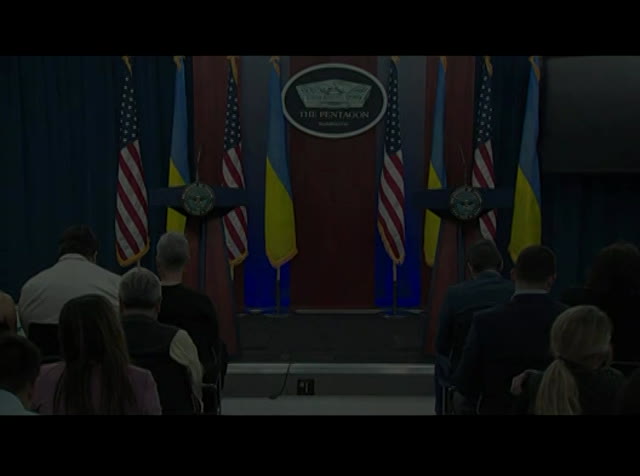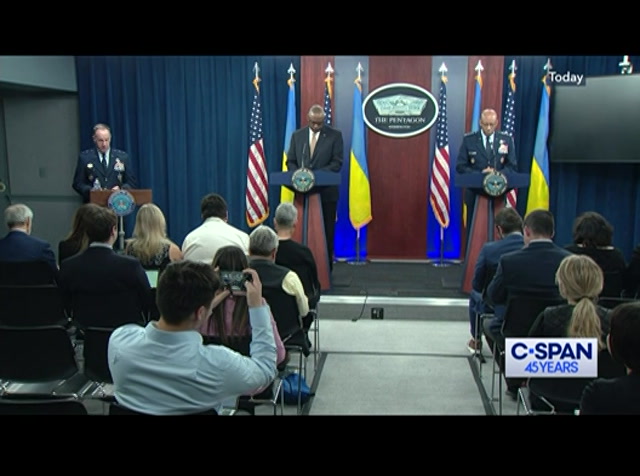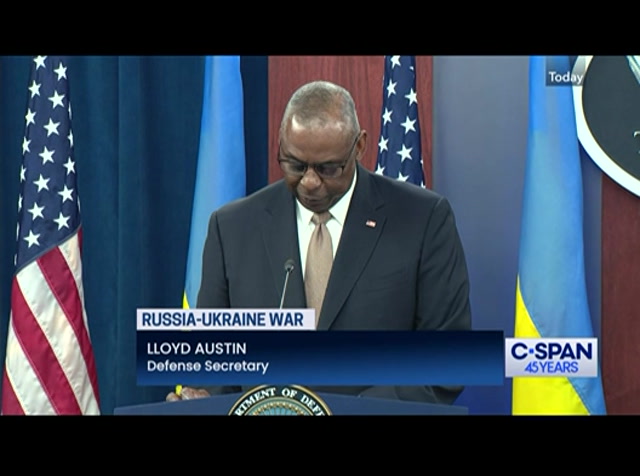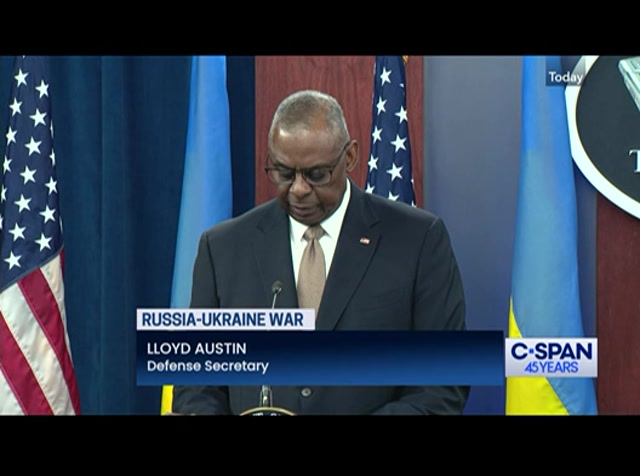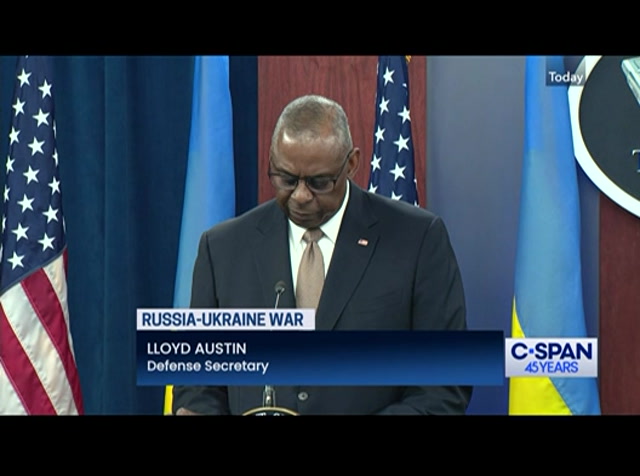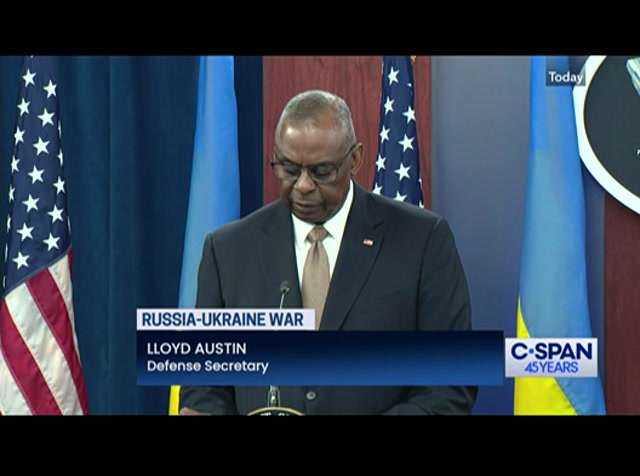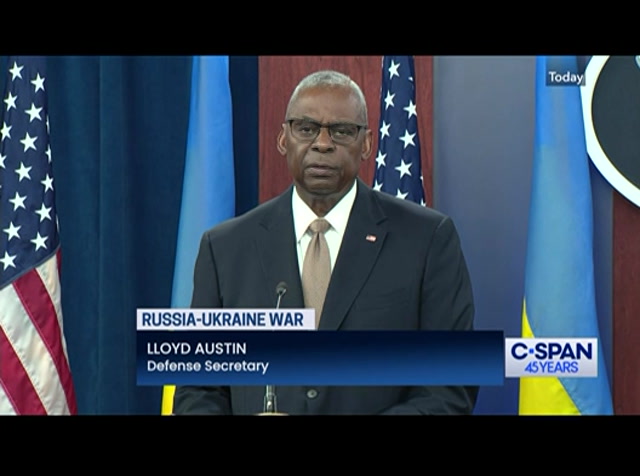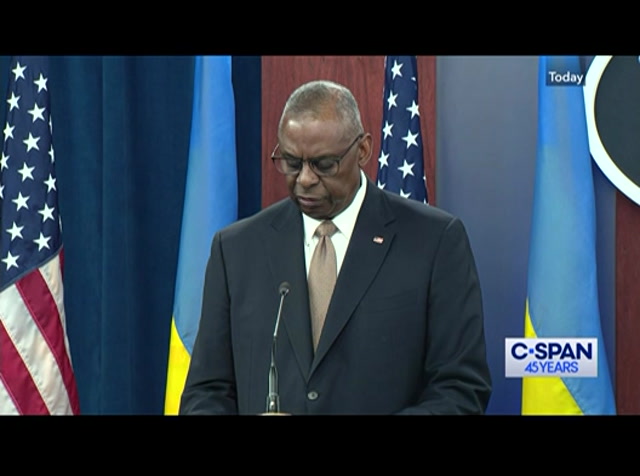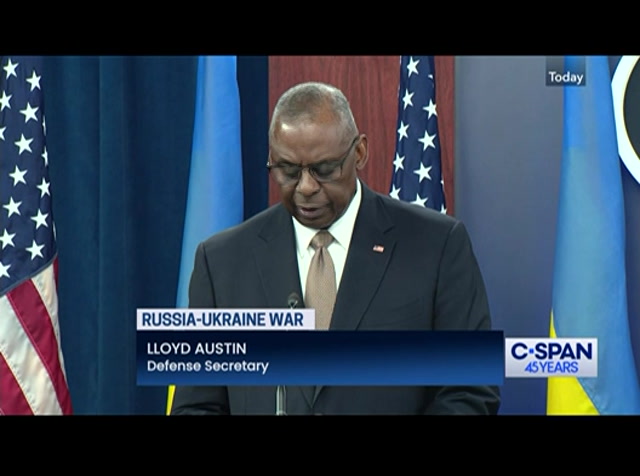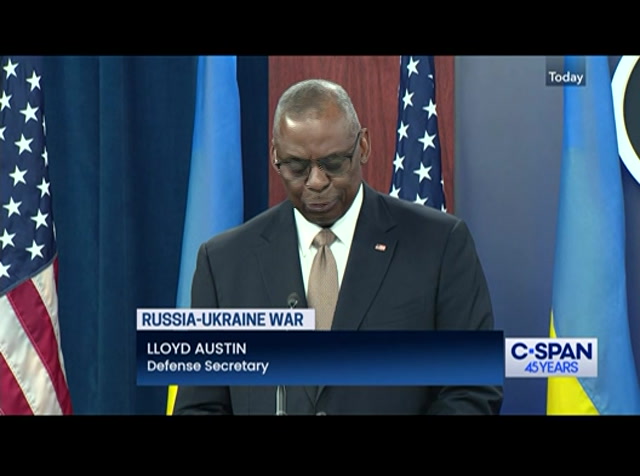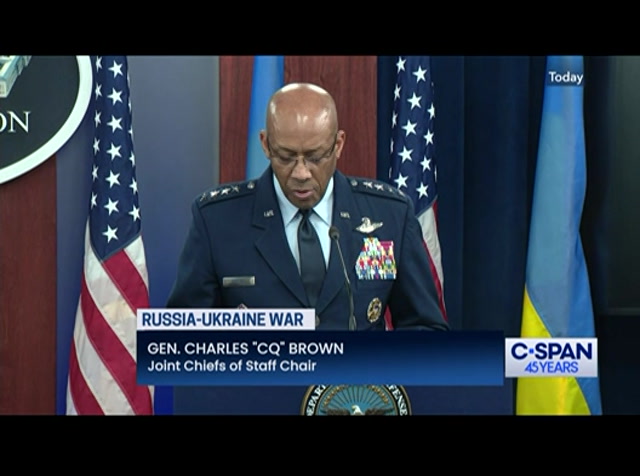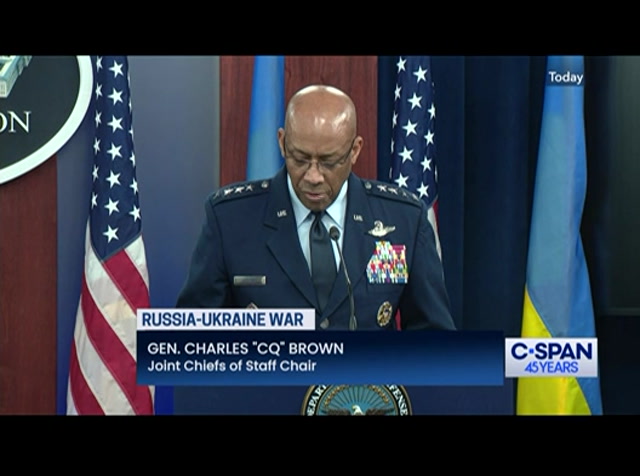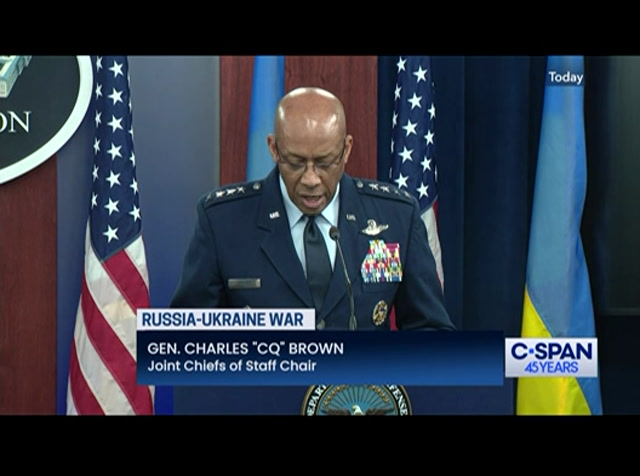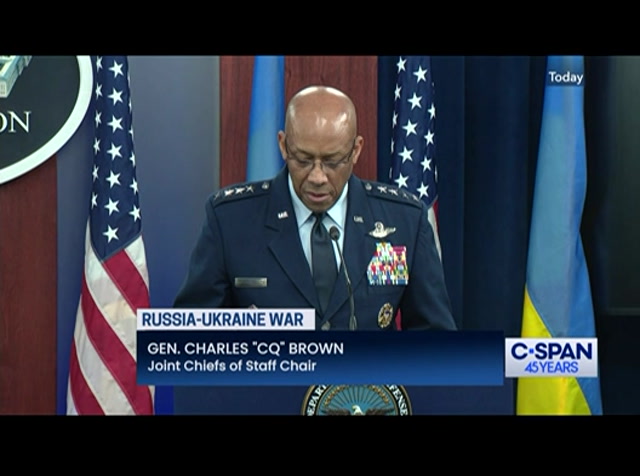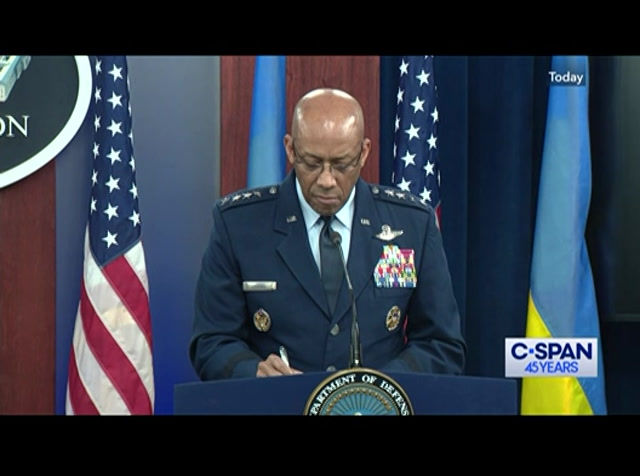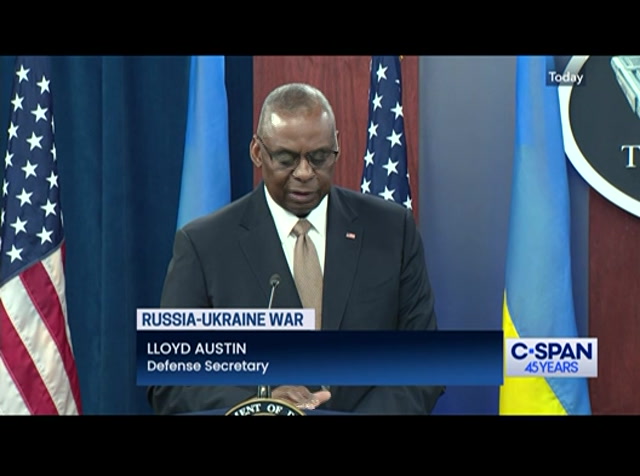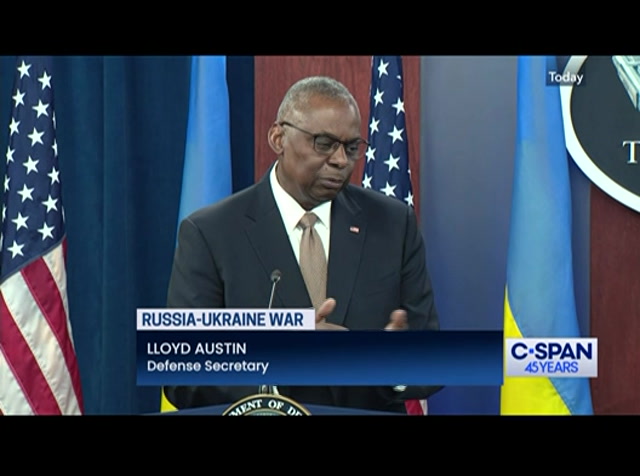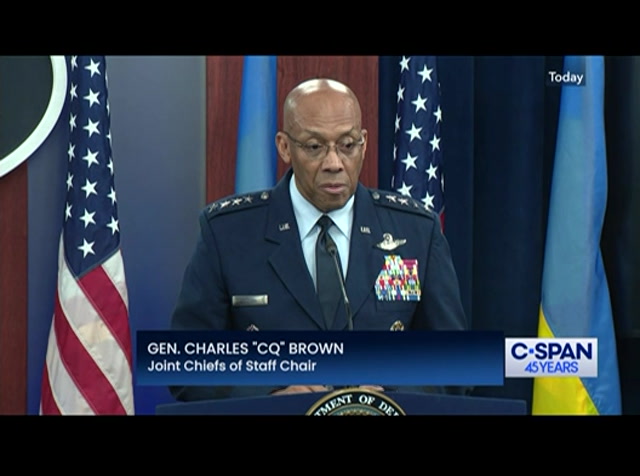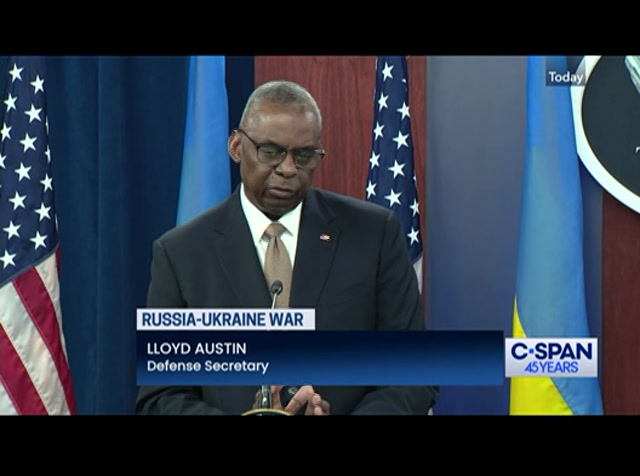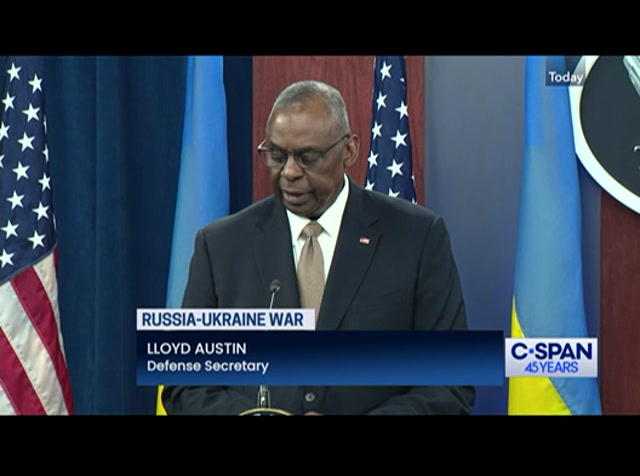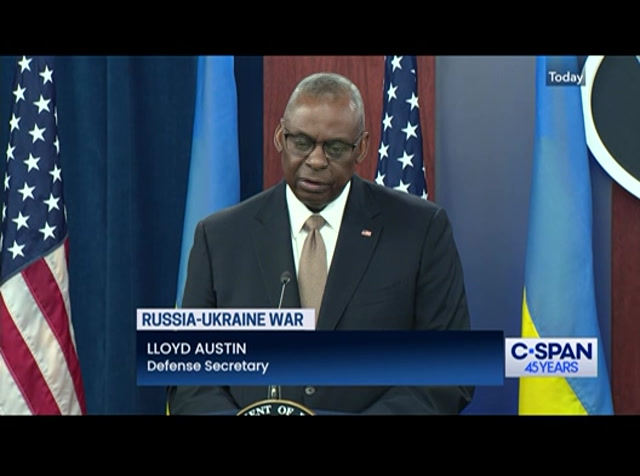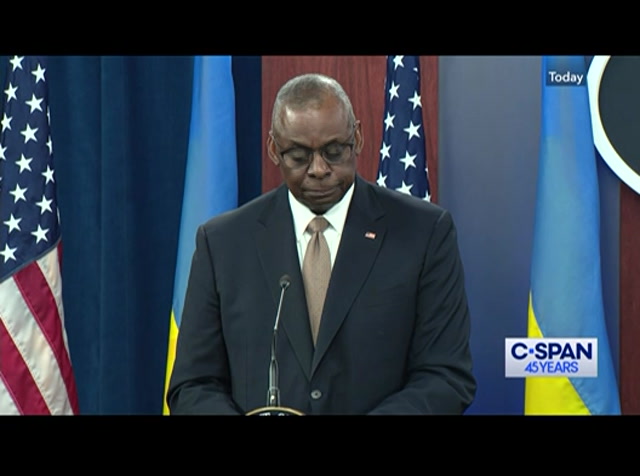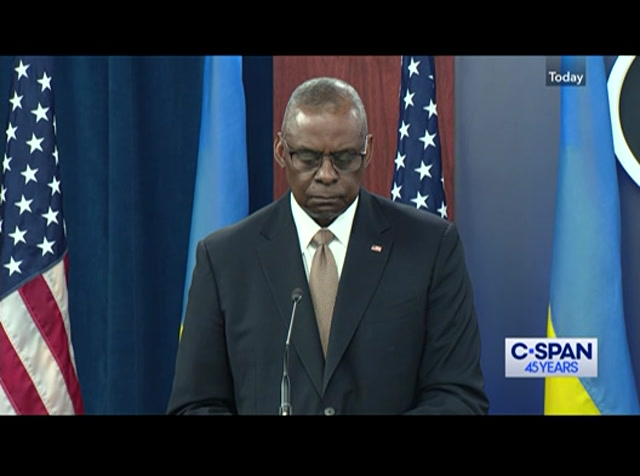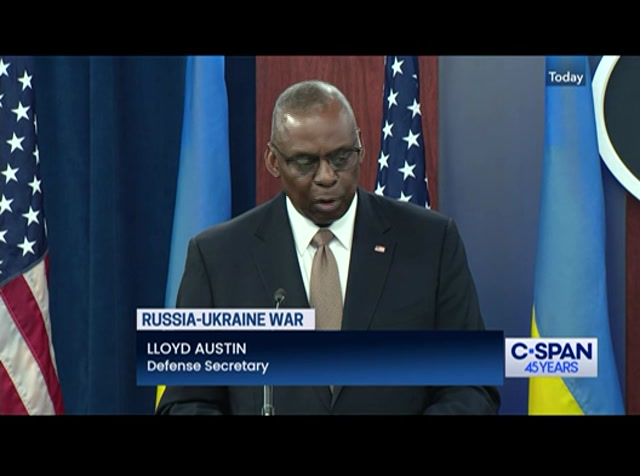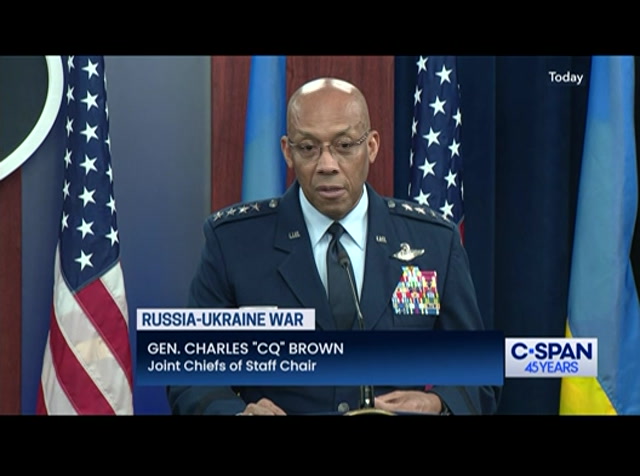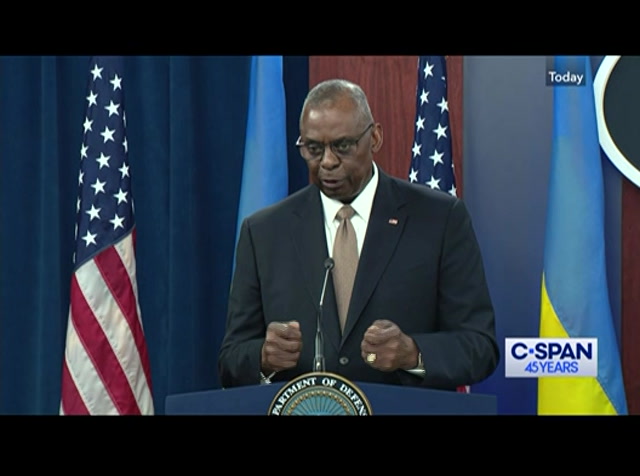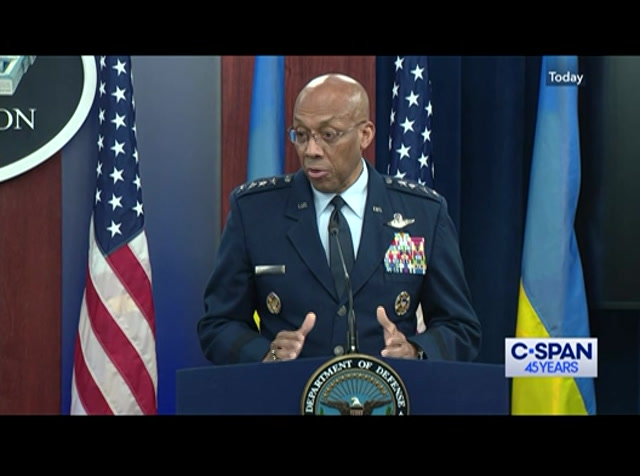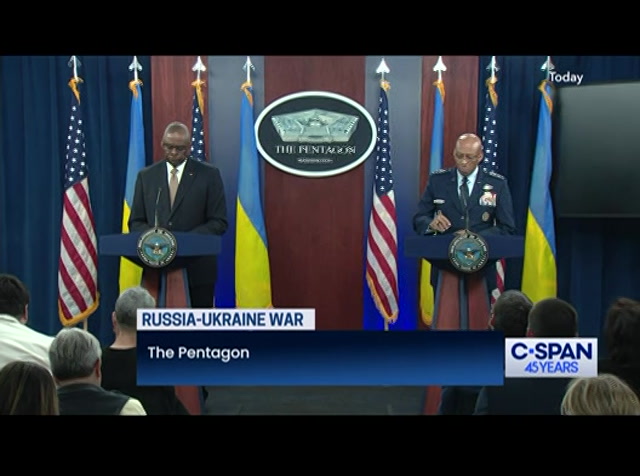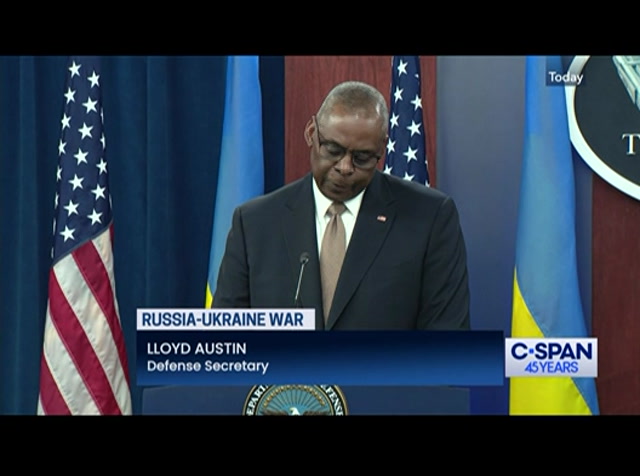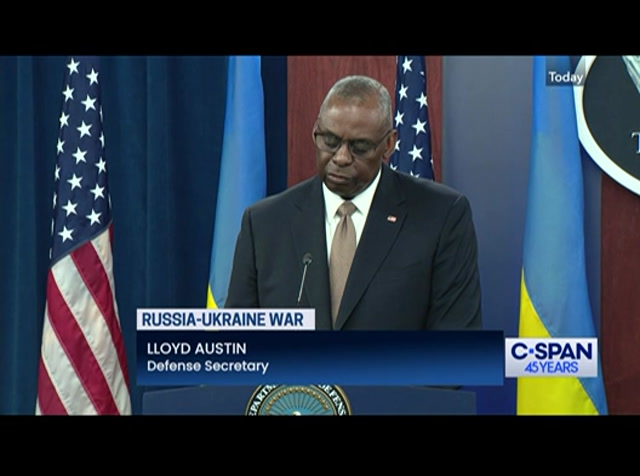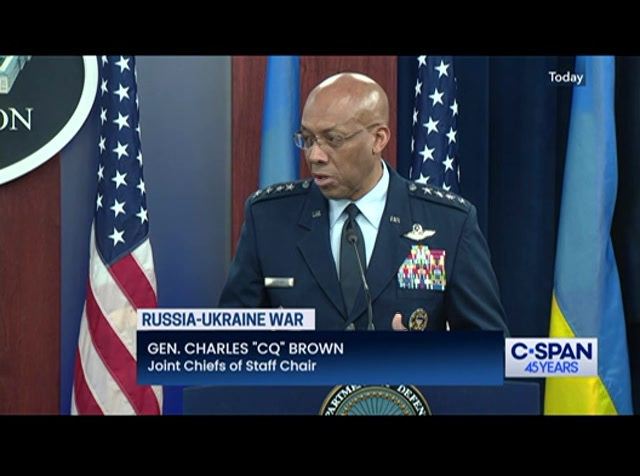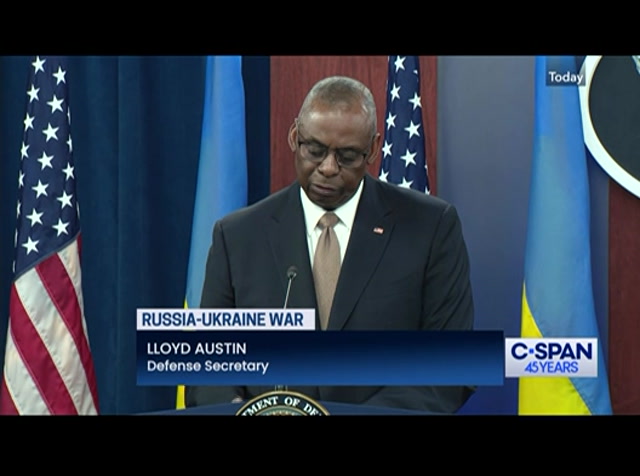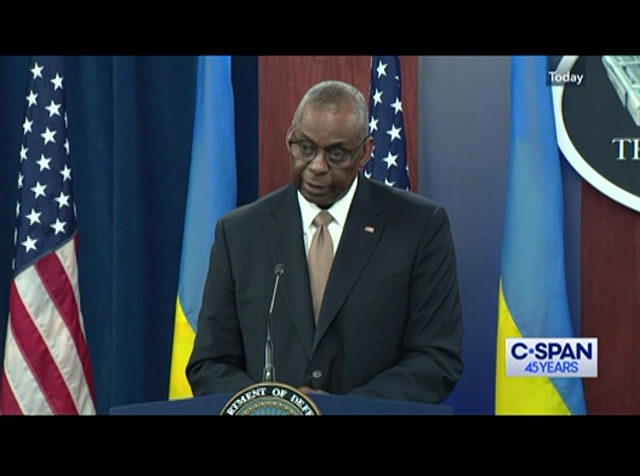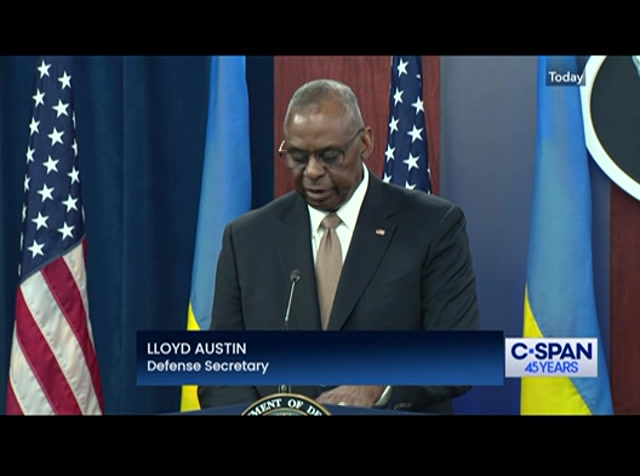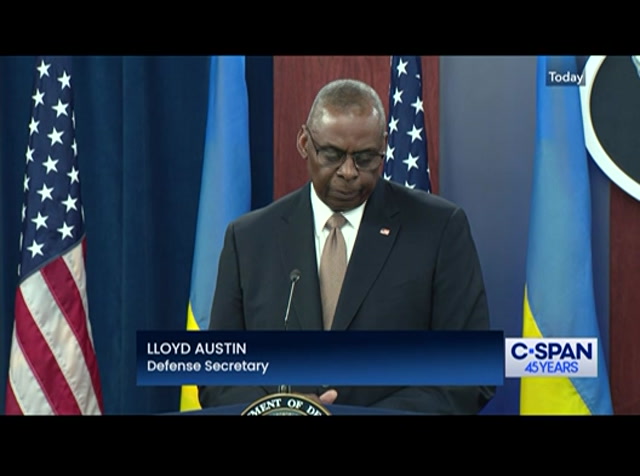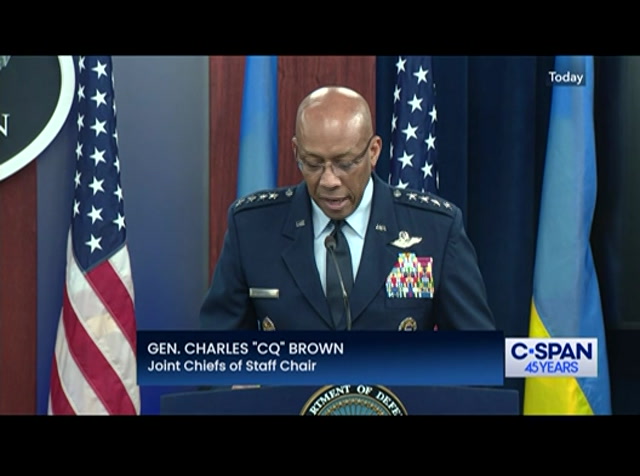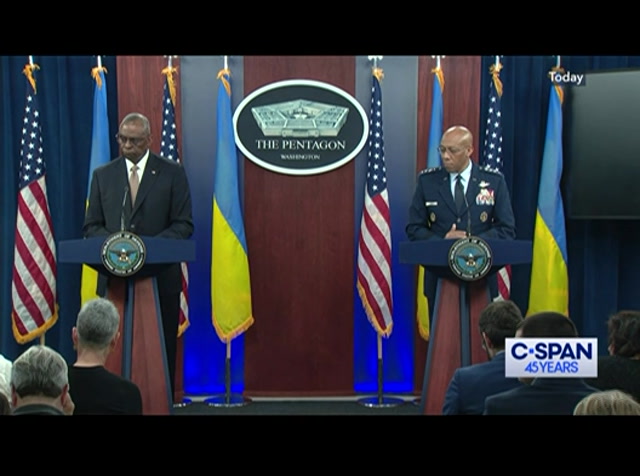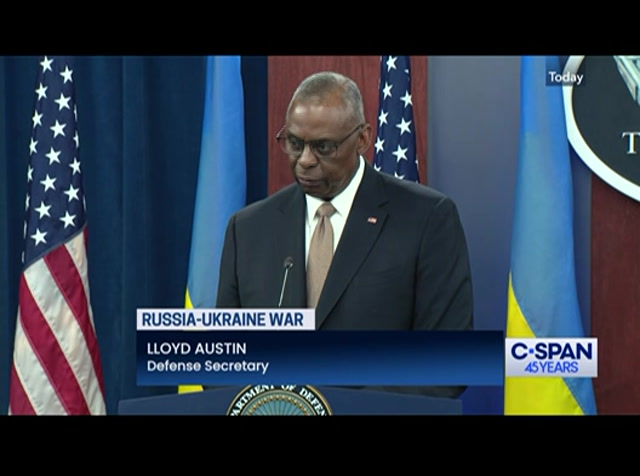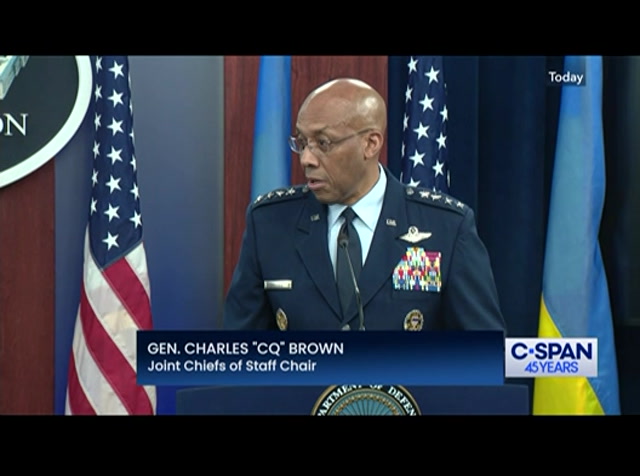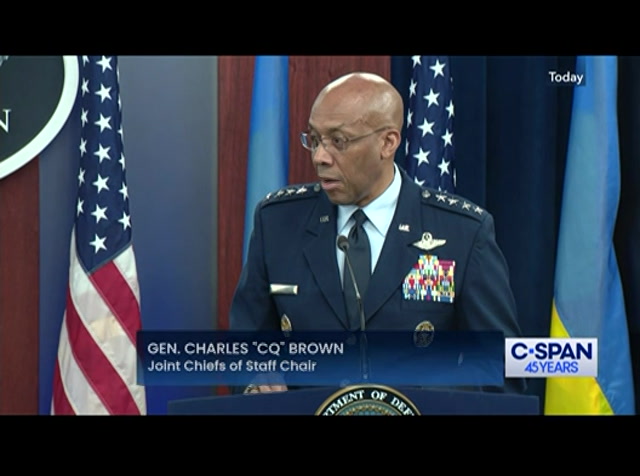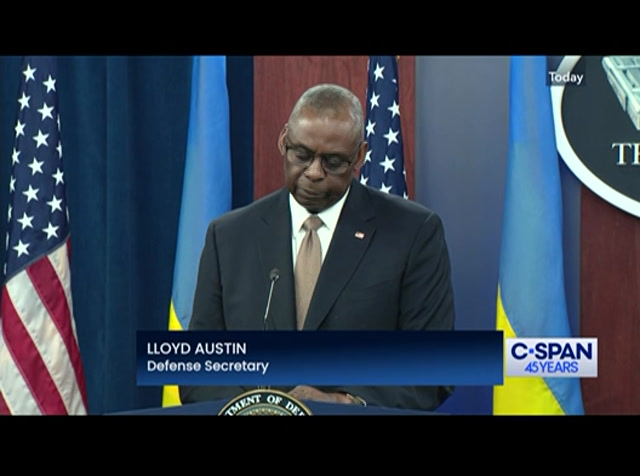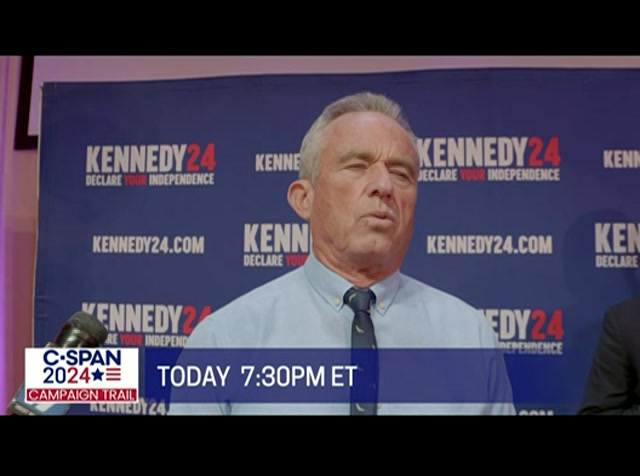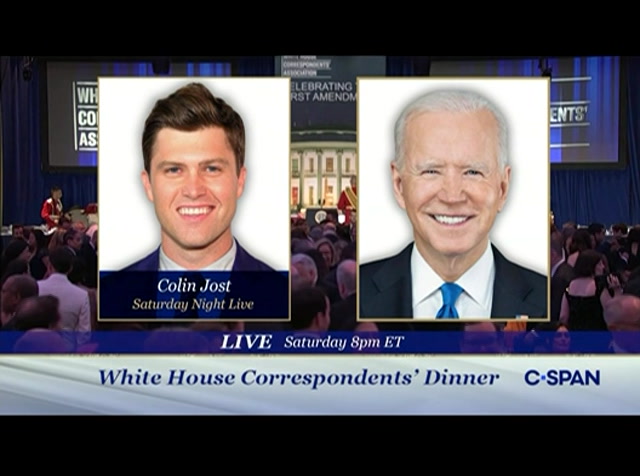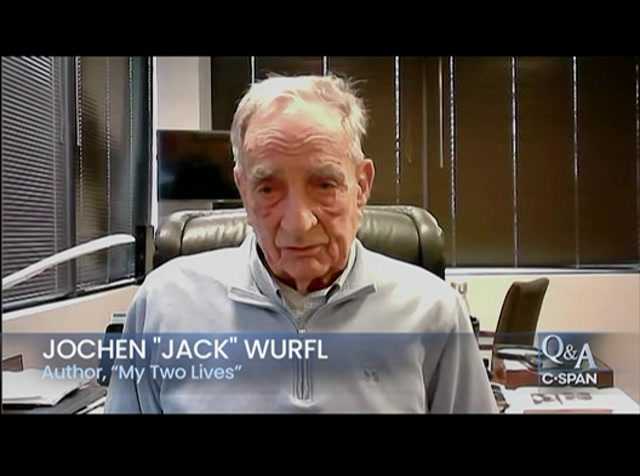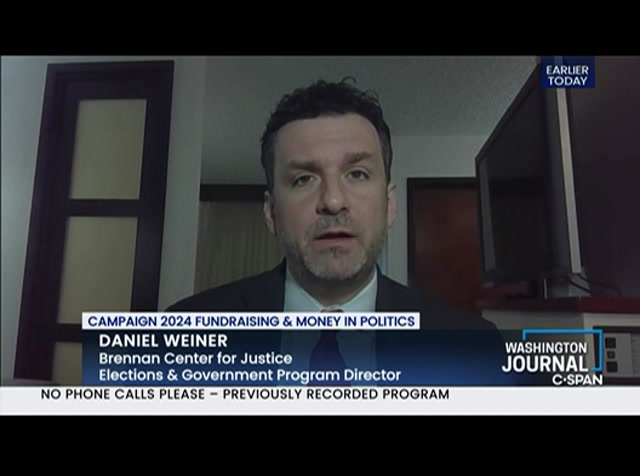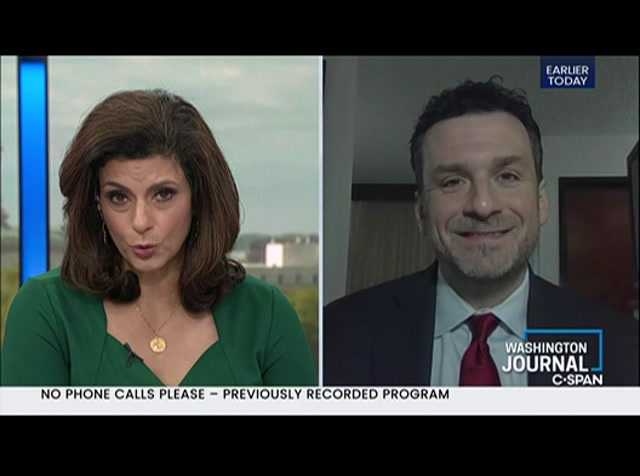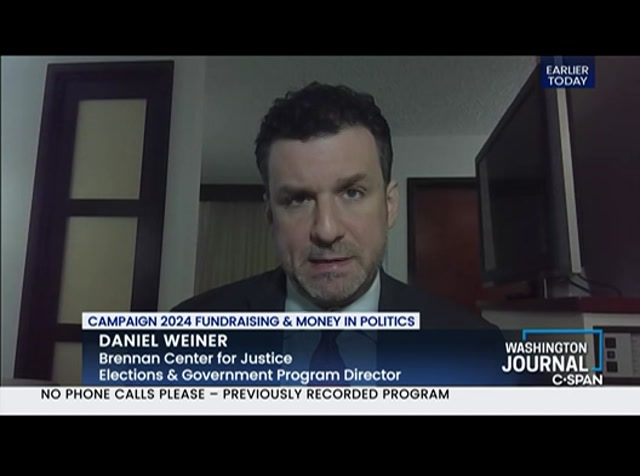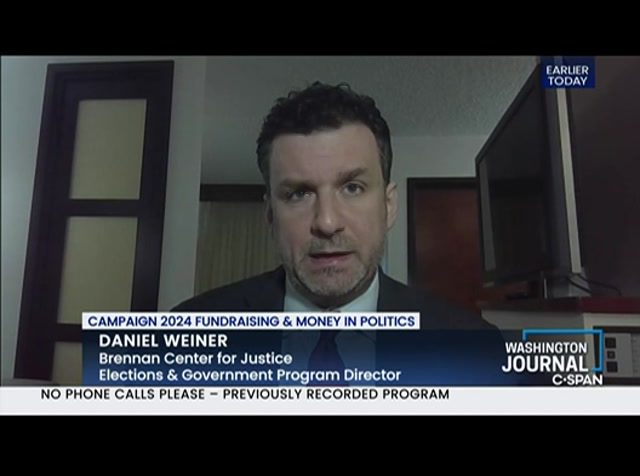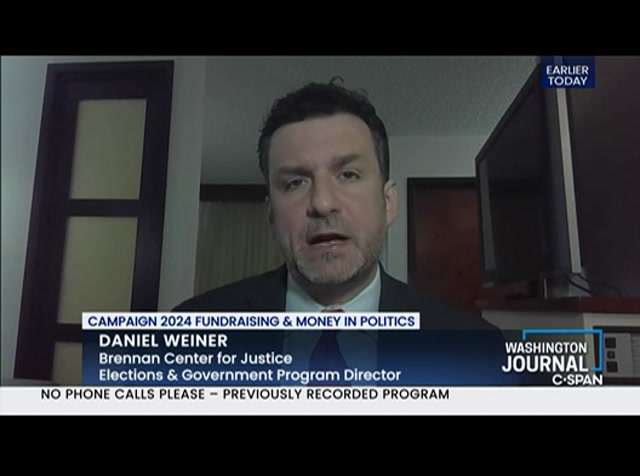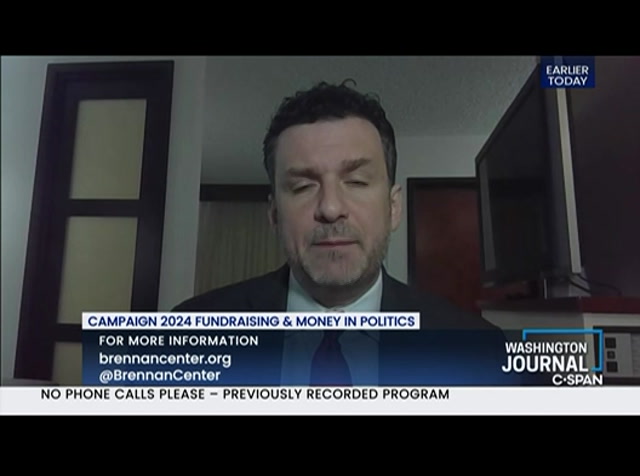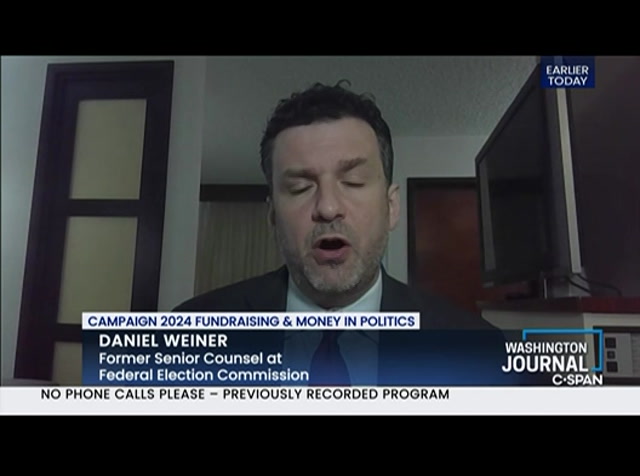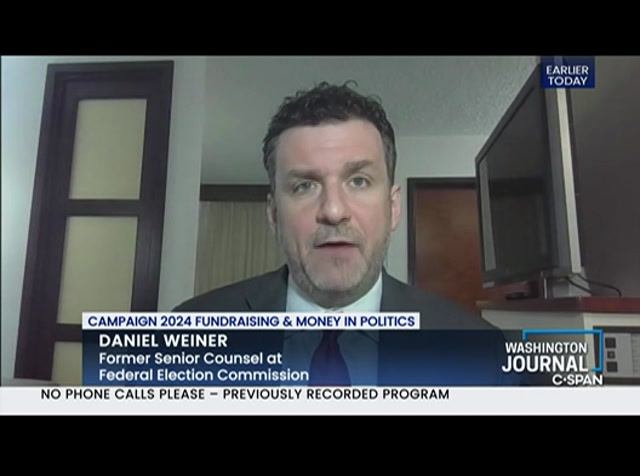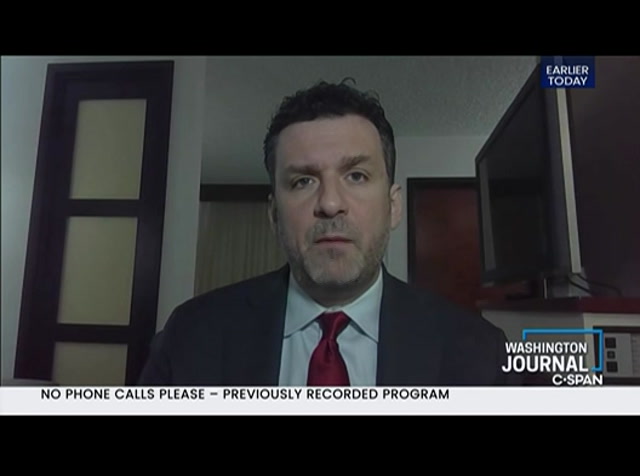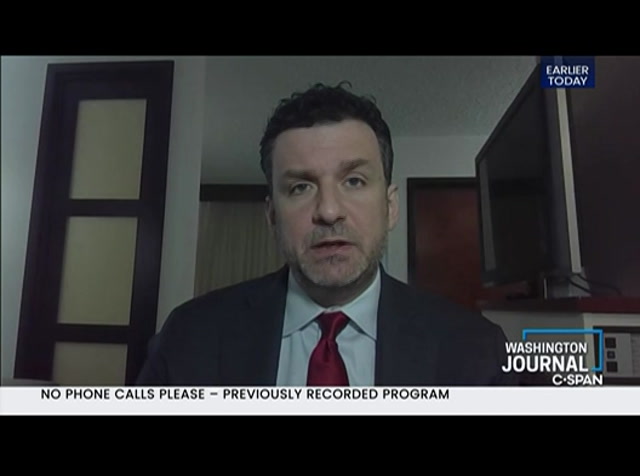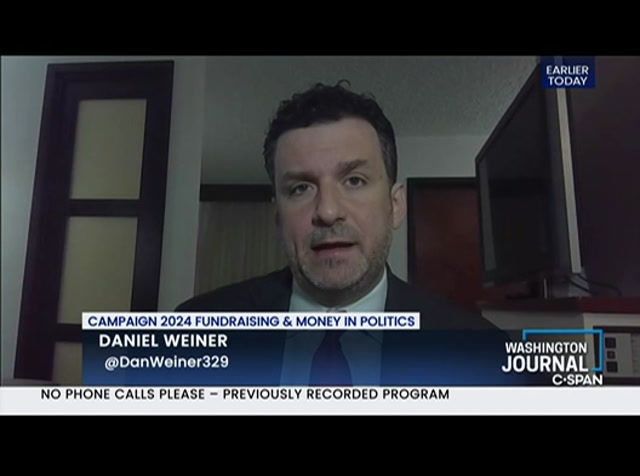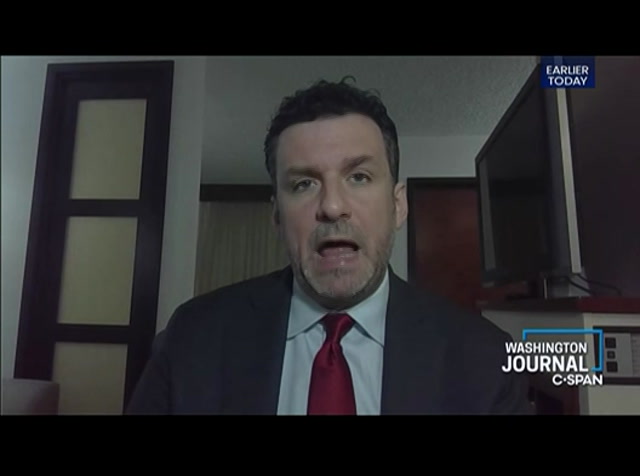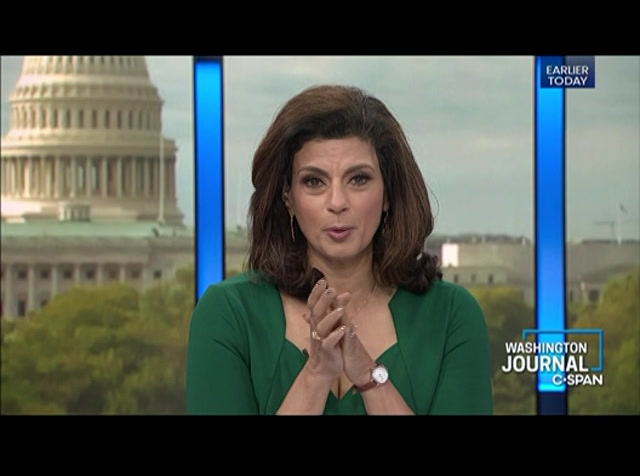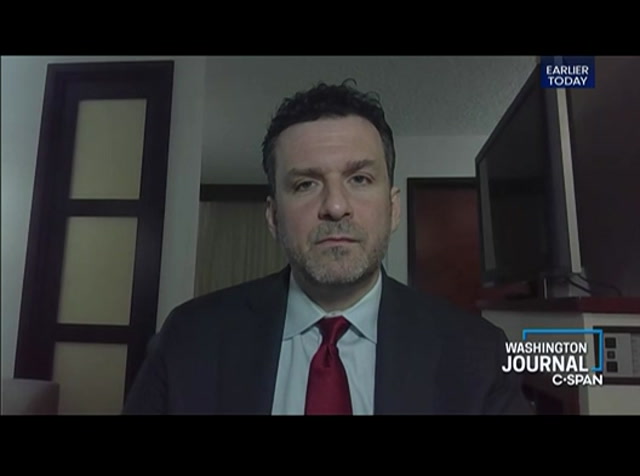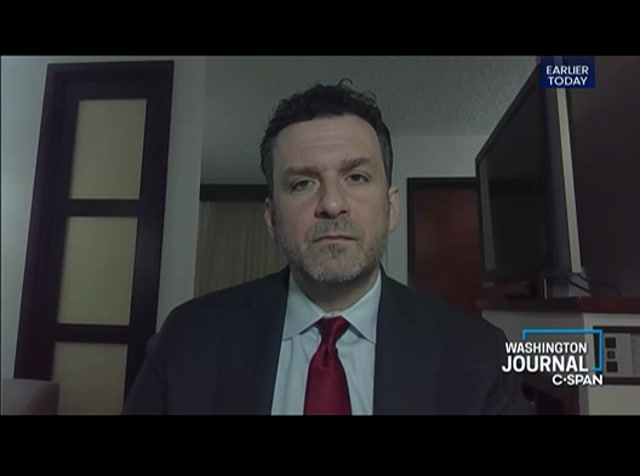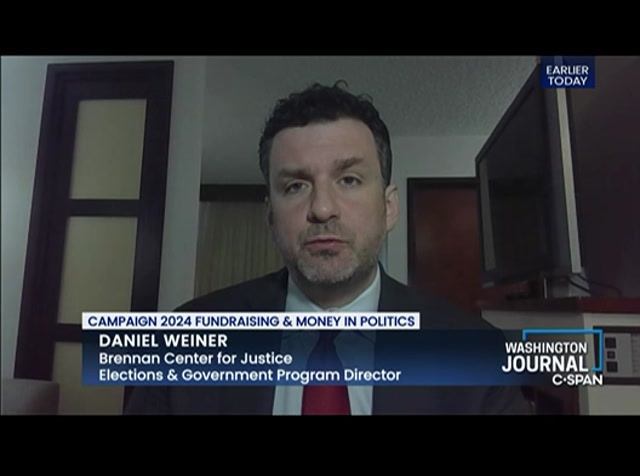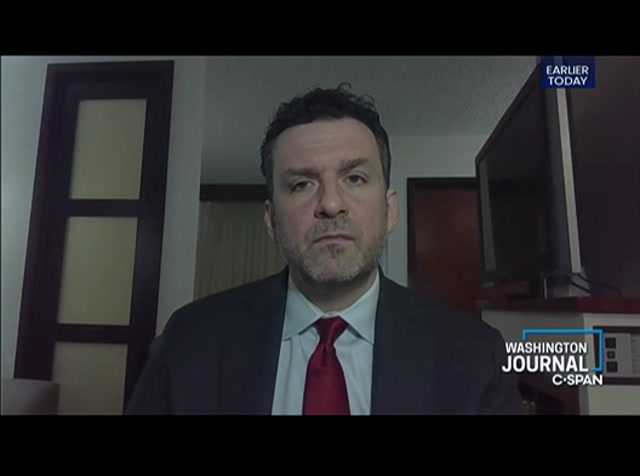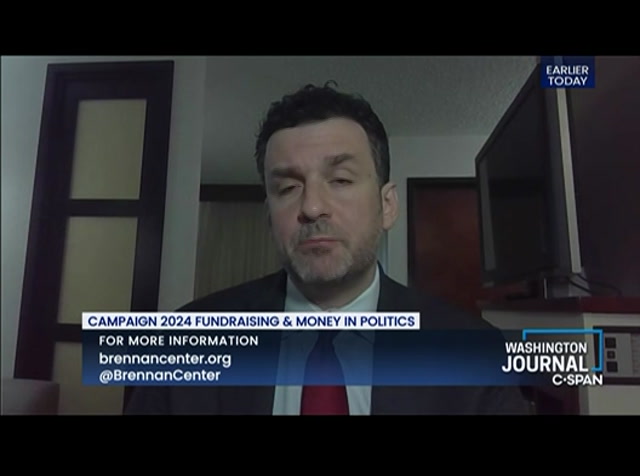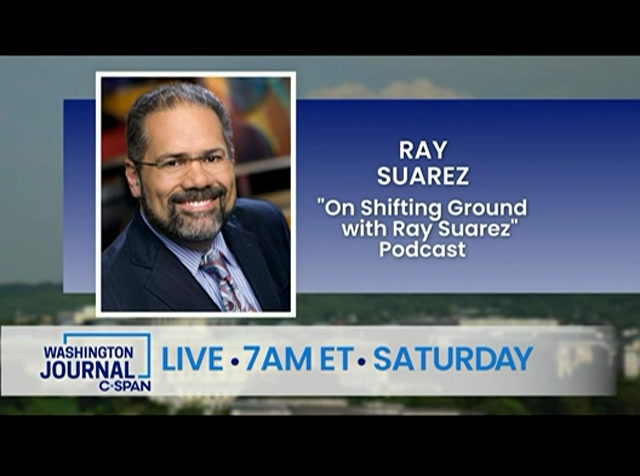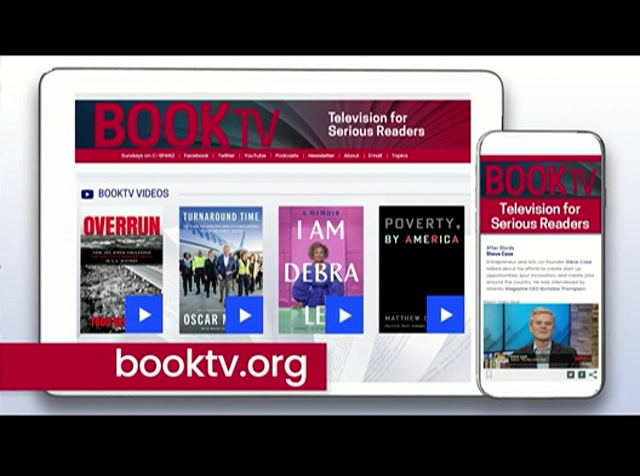tv Defense Secretary Joint Chiefs of Staff Chair Announce Security... CSPAN April 26, 2024 6:20pm-7:31pm EDT
6:20 pm
once they were to leave, we would go home and asked our mother. after a while, all of a sudden to our surprise, it was my mother who was buttered building in one of the gestapo cars and taken away. reporter: with his book "my two lives come since sunday night at 8:00 p.m. c-span1 c-span's q&a. you can listen to q&a podcasts for free on our c-span now app. [gavel bangs] the house will be in order. >> this year c-span celebrates 45 years of governing congress like no other. since 1979, we have been clamoring for us on capitol hill, providing balance, unfiltered coverage of government, taking you to where policy is debated, with the support of america's cable companies. c-span, 45 years and counting.
6:21 pm
powered by cable. >> u.s. defense secretary general lloyd austin announced an additional $6 million security assistant package through the ukraine security assistance initiative and called it the largest security assistant package the u.s. has committed today. he made that announcement to reporters at the pentagon after he and the joint chiefs of staff tarek met privately with ukrainian president zelenskiy and members of the ukraine defense contract group. >> good morning and thank you everyone for being here today. it is my pleasure to introduce territorial defense lloyd austin roman 3rd, and general of the joint chiefs of staff general charles brown, jr.. we will have time to dig a few questions.
6:22 pm
i will moderate these questions and, and journalists and due to time constraints, we ask that the site, plan to limit their questions to give your call is a chance to answer questions. > my first question for you is, who pulled the fire alarm? [laughter] ok. [laughs] well, i didn't. but, thanks for joining us everybody. general brown and i have just come from the 21st meeting of the ukraine defense contract group. we were joined by a great team from ukraine led ministry of defense. i convened what would become the ukraine defense contact group for the first time in weinstein airbase exactly two years ago today, and some of you were there at that meeting.
6:23 pm
thanks to underscore the achievement of the contact group over the past two years, we were joined this morning virtually by president zelenskyy. at the first weinstein airbase -- ramstein meeting, ukraine's defenders had been at the russian army -- beaten back the russian army. ukraine has not fought back for 793 days. that is more than 2.5 times as long as the value of verdun during the first world war and more than the soviet union blockade of berlin during the cold war. ukraine is still in the fight and still showing incredible skill, courage, and resilience. and this coalition is still standing strong. over the past two years, this contact group has shown its
6:24 pm
unity, its impact, and its staying power. we have made history, and we have changed history. this contact group includes some 50 members of our allies and partners from around the planet, and we stand united in commercial and military assistance for ukraine. we have searched in critical capabilities again and again. and this contract group and made a huge difference. contact group members have committed more than 95 million dollars in security assistant to and i am very proud of american leadership and contributions. i am glad that president biden could sign into law additional lifesaving assistance for ukraine, as well as more funding for a girl, timeline, and our defense industrial base, and that will lead the united states move out immediately to send ukraine critical air defense capabilities and artillery,
6:25 pm
armor, and from the military stocks that president biden announced wednesday. i am also pleased to announce today an additional commitment of $6 billion through our ukraine security assistance initiative. that will allow us to procure new capabilities for ukraine from the u.s. industry. this is the largest security assistance package that we have committed today. it will include critical interceptors for cranes patriot antimissile air defense systems, more counter driven systems and support equipment, significant amounts of artillery ammunition and air to ground munitions, and maintenance and sustainment support. so the announcements this week underscore america's enduring commitment to ukraine's defense. i am also proud of all the
6:26 pm
capabilities of our allies and partners have provided to ukraine. our contact group partners have contributed most of the counter you a s systems provided to ukraine and most of that 155 millimeter artillery systems, it was tiger tanks, most of the armored personnel carriers, most of the infantry fighting vehicles, and more. throughout putin's war choice, his contributions have been important and they have saved countless lives. so, two years later, this contact group stands strong and this coalition stands together. and we will not falter. we will not flinch. and we will not fail. to get there we will continue to work on two things.
6:27 pm
helping ukraine meet its urgent barrel needs, and helping ukraine build a future for us to stave off and deter russian aggression over the longer-term. over that first track, replaced especially hard today to rush in more air defense systems and interceptors. and on the second track, this contact group is working with ukraine to help it move forward robust, efficient and self-reliant defense. much of this work is taking place in the contract group -- contact group's new coalitions. they are looking for ways to further strengthen ukraine's capabilities and they are identifying where and how to boost ukraine's capabilities in areas such as air defense, airpower, artillery, maritime
6:28 pm
security, armor, information technology, demining, and uavs. i am grateful to all the countries heading up the capability coalitions that are now up and running. now, when this contact group first met at ramstein air base, i said that putin never imagined that the world would rally behind ukraine so good. and surely, and they said that this coalition reflects a government world. it still does. the nations of good will gathered gathered today illustrate what is at stake. for ukraine, per your, for the united states, and for the world. the outcome in ukraine will determine the trajectory of our times if we can configure ukraine, the security
6:29 pm
consequences great and lovable. beautiful face the security bracket has not seen in our lifetimes. as president biden has noted, aggression will not stop praying. if the government gets its way, if buttons were of imperial aggression succeeds, every. on earth will take -- every tyrant on earth will take note. so we have a chance to shape the kind of rock that our children and grandchildren live in. putin is more is the final assault on the very idea of an open wound of needs and responsibilities -- open world of moods and responsibilities. the cost of standing firm on her own dwarfed by the cost of caving in. that is clear to the extraordinary contact group and to the government world.
6:30 pm
with that, only turn it over to general brown. >> thank mr. secretary. each and every one. in moments of challenge, history can reflect insights that inform the resident. shortly after the korean war, professor marshall accepted the nobel peace prize and said, for the moment, the maintenance of peace does depend on a very large measure on military power. marshall believed military powers not sufficient. he continued -- i believe there is a readiness to cooperate, which is one of the great and hopeful factors of the world today. we must stand together strongly. principles of military strength and international cooperation are more important than ever and
6:31 pm
serve as a cornerstone of our commitment to afford the 70 nations such as ukraine. the work of the defense contract is firmly rooted in these principles. once again in want to thank secretary austin. bishop in starting this international coalition that have been for two years. thanks also to the defense minister and the general who joined us today for their resilient leadership of ukraine's armed forces. and to nations attending the udcg today, their efforts remain vulnerable to this coalition work supporting ukraine. russia's working ukraine endangers the sovereignty of nations and the rule of law and raced up check and information transfer 70 war. as marshall, the role of military power in this case a combined with support from a unified coalition is crucial to
6:32 pm
respond to and hostility. russia's ongoing aggression against ukraine, and ukraine's fight for sovereignty is a matter of international significance. a direct challenge to global security and that of nato and the united states. ukrainian forces are facing severe challenges their operational temperature is hindered not by a lack of will, but by building supplies. you just continue fortifying defenses against significant odds knowing that their armament s cannot stop a resurgent russian force without sustained military support to ukraine. meanwhile, russia is aggressively reconstituting its military force using its numerical advantage to wear down ukraine's result and resources. the u.s. military, up and say
6:33 pm
who is not an effective course of action. ukraine has been left hoping for urgent replenishments of air defense artillery and armor that is why we all need to operate with the sense of urgency the . the recently passed national security supplemental bill provides a vital lifeline to ukraine at a critical juncture in this conflict. two days ago, the united states announced a very significant $1 billion security assistance package that will provide much needed munitions and support to ukraine. this package includes capabilities, weapons systems and munitions that will help ukraine shore up its defenses and provide critical air defense munitions protecting ukrainian forces. critical national infrastructure and population, helping to counter russia's plan. the mission of the udcg matters. it is critical. get price action. leaders don't stand on the sidelines. our efforts to assist ukraine
6:34 pm
set an example. if russia wins, the repercussions will be found well outside ukraine's borders, risking further escalation. the fight in is not just a distant battle, it is preventing a wider conflict that could potentially draw others deeper into prolonged armed engagement . what happens in one corner of the world doesn't stay in one corner of the world. this is what george marshall meaning, peace and security are achieved through military. the efforts of this coalition uphold an international order that benefits the population of all countries who seek freedom , democracy in the lab. thank you and look forward to your questions. reporter: associated press. good afternoon, thank you so much. mr. secretary, president zelenskyy this morning made it clear that his country needs patriot systems, not just the
6:35 pm
munitions that go with it. can you say how much if any progress. today on the considering the number allies have expressed reluctance in sending these systems that they just don't have very many of? and mr. chairman, if i could switch to a different topic for you, and gaza, a lot of the aid agencies are very concerned about security came in and around the port particularly testing. distribution of the aid. what assurances have you gotten from israelis about security at the airport including for their own troops who have had incidents where they had killed aid workers? in the talk on bit about that? -- can you talk a little bit about that. sec. austin: in terms of patriots and what they will have to do going forward, it remains to be seen. i can tell you that we continue to work on this in a very earnest manner.
6:36 pm
all of the countries that have patriots certainly value their capability. but i think going forward, we will be able to hopefully work with a number of countries to put together an additional picture capability. you may have noticed the last several days, i have been talking about -- talking one-on-one with my european counterparts, actually discussing this issue and other issues. but again, we will continue to work at this until we have the right kinds of capability. i would point out, it's not just for. that they need, they need other types of systems and interceptors as well, so i would caution us in terms of making patriots the silver bullet. i would say that it's great to be the integrated defense as we
6:37 pm
have said so many times before that really turns a tide. there are other capabilities that we really pushed hard to get and we may be able to get to the ukrainians a little bit faster. but this work continues already. you know that jan stoltenberg talk to other ministers of defense on this same issue a week ago. and in addition to the work i am doing with my colleagues, we will continue to emphasize that countries, we are going to ask them to accept a little bit more risk so that we can do what is necessary in ukraine. gen. brown: i quite appreciate the question. one of the areas that we have been focused on as we move down the path to bringing our joint logistics over the shore and build the port on the beaches of gaza there is not only the security of the port itself the security of our forces but also the security of the distribution and also the aid workers.
6:38 pm
and a couple of things that we have done is engaged not only with our israeli counterparts, but also with some aid agencies as well. we have talked specifically about the security for the port area as well as the distribution . after the unfortunate incident that killed their workers from world central kitchen, i talked to my israeli counterpart about the incident itself. the investigation they did, and the corrective actions that they were putting in place. that has been part of the discussion between united states central command leadership, they have been engaging with the various agencies that will help with the distribution to provide them the confidence that we've worked with closely with the israelis to provide for their protection, and ensure that they have the procedures in place so you don't have an incident that is very similar to what occurred previously. reporter: mr. secretary, some
6:39 pm
critics say that the u.s. strategy in ukraine has been to give ukraine enough assistance not to lose about, not enough to win for fear of provoking russia because russia is a nuclear power. will there be any restrictions on the new weapons that are being sent the attacks and others, where they can be used and where they can't be used? and what would you say to republicans who wanted to get paid to ukraine who say that you don't have a strategy? do you have a -- republicans who voted against aid to ukraine who say that you don't have a strategy? do you have a strategy? sec. austin: thanks. our goal is to see a democratic, independent and sovereign ukraine that has the capability to defend itself and deter aggression going forward and so you see us working towards that end with not only the capability that we are providing ukraine in the current battle, but the kinds of things that we are
6:40 pm
helping ukraine built for the future. pointing back to the capability coalitions. so in terms of what ukraine needs on a day-to-day basis, as you know, i talked to the defense minister every week and we talk about what the requirements are, what is most critical. in days gone by when others were talking about different types of systems, we were focused on providing ukraine adequate air defense capabilities. and we have seen how important that was over time. and it will continue to be important going forward. without that focus, without that kind of capability, ukraine would be in much worse shape because of the capability of the forces. so i would caution anyone and
6:41 pm
saying, in believing that one type of system will be a silver bullet. it is going to be a combination of systems. it will be dependent upon whether or not ukraine can effectively employ these systems and sustain those systems. and whether or not ukraine can mobilize an adequate number of troops to replenish its ranks. and so we continue to work on all those things simultaneously. and we really want ukraine to be successful, we have invested a lot. this is really important not just for ukraine, but for the world and for other reasons you heard me talk about in my opener. reporter: general brown, can ukraine win? gen. brown: the key part is to make sure that ukraine can defend itself. i checked aggression it leads to
6:42 pm
more aggression. this is where it is so important to put ukraine in a place where it can defend itself and we don't have this brought into a much broader conflict. when i think about how world war ii started or previous world wars, this is so important that we have ukraine defense contact group and other nations around the world that are focused on ensuring ukraine is successful. sec. austin: sec. austin: ukraine can be successful if it has the right amount of security assistance. we are very grateful for congress passing the supplemental, and, again, if you think about what russia intended to do fairly often -- early on, what its strategic objectives were and the fact that it failed to achieve any strategic objectives, two years later, 793 days later, ukraine is still fighting, still holding its ground. remarkable. it is holding that ground even in the face of a question as to whether or not we were going to
6:43 pm
continue to support them. that question is off the table now. it has reassured the ukrainians, but also it has reassured our allies and partners around the globe. reporter: mr. secretary, national security adviser jake sullivan raised the concern this week about there being a catch-up period in terms of getting interceptors and some of this new aid to ukraine. can you speak to the vulnerabilities, the concerns that we are in this particularly sensitive time? and then, mr. chairman, there is reporting out this week suggesting that ukraine has had to pull the abrams tanks that the united states sent, in part, due to concerns about the fpv drawing thread. can you confirm if that is true and put it into a larger context of what it means in the battlefield? sec. austin: thanks for the
6:44 pm
question. i would say that the commitment united states has made is material. it is real. it is substantial. and we will do everything we can to get that security assistance to the ukrainians as quickly as possible. you heard us talk, about you heard general ryder mention a couple of days ago that we had done some things to preposition stocks in europe so that we could cut down on the amount of time that it took to get certain types of things into the hands of the ukrainians. even with the naugh it is going to take time to get things in the country. and distributed to the point of need. consider the fact that even without that, the ukrainians were able to hold their own forte which of time with this capability, we expect that they will do a lot better. i may have indicated earlier,
6:45 pm
they are doing additional things to mobilize additional troops to replenish their ranks. i think all of those things are going to come together to put them in a much better place. but it will take a little time. as i talk to ukrainian leadership, i am confident that they can continue to hold their own and then as they get a bit stronger, they will have options available to them. i appreciate gen. brown: the question, i will defer to ukrainians and how they use the abrams. i will highlight the use of the first person view drunks by both sides and the innovation it has brought to the conflict with that capability. it is something we can all learn from, how we are able to adapt in conflict, and that the character of war is indifferent, various weapons systems through innovation, this is why it as a chief of staff and as chairman, i am very focused about how we
6:46 pm
bring innovation and how we move much more quickly to ensure we can adapt in that battle environment. you are watching that happen in the battle there in ukraine. reporter: a couple of questions. one on the $6 million u.s. aid commitment. what types of systems are you talking about? we talking eight euros, not contracts going out today. is that accurate? mr. chairman, the aid package that one of the other day, will it roughly allow ukraine to start a mini offensive or to be more on parity with the russians in terms of 155's and the cluster munitions, sending more defense versus offense? sec. austin: thanks. in terms of how long it will take to deliver the capability that we are investing with u.s. aid funds, it depends on the type of system. as you know, some of the
6:47 pm
platforms have a much longer lead time to construct as well as some of the munitions, so it depends. you can rest assured that we are going to move as fast as we can to give them the capability, as fast as industry could produce, but we will move at the speed of industry. and we are investing in industry as well so they can expand their capacity. some of what was in that supplemental allows us to do that. the types of things that we are investing in the same types of things you heard us talk about earlier. they need air defense interceptors, artillery systems and munitions. they need armored vehicles. they need maintenance and sustainment. all of these kinds of things are included in the u.s. aid package. gen. brown: what this package
6:48 pm
gives the ukrainians is a bit more flexibility. as you might imagine, we are very much appreciative that the supplemental was approved. they have had to actually ration and conserve munitions over time. so with this package and the follow on package because of the supplemental, it gives them more flexibility to use that capability effectively against the russian threat. reporter: thank you, mr. secretary. what made you change your mind on providing long-range attack drones? will they be included in the aid package announced earlier this week? and since you talked about this will take time, has any of the aid from the $1 billion package actually reached ukraine at this point? then, mr. chairman analysts are , cautioning us that it will take a lot of time before we will see the effects of this current aid on the battlefield . when do you think that ukrainians will have the
6:49 pm
opportunity to, again, have the upper hand? sec. austin: in terms of the provision of the attack, as you know, we provided ukrainians those things before. they come in various types with different ranges. of course, there are mixtures of munitions here going forward. i will not get specific in terms of what we provided and when the ukrainians will actually put those munitions to use, but the key point is that they have the capability. now, that capability alone is not a silver bullet. it is the integration of that capability with the other kinds of things like storm shadow and other things that other countries are providing that really then gives them a capability to conduct a long -range campaign. i think that is what is most important. but in terms of specifics of,
6:50 pm
you know, how many and where, i would let the ukrainians speak to that. reporter: let me follow-up, officials had expressed concerns before that the ukraine might try to fire attack drones into russia or that there weren't enough in u.s. stockpiles. did either of those affect your decision to provide the low-range attack drones? sec. austin: as you know, i always have a concern about the united states having the capability to defend itself and to also support our operational plans. and i can tell you that we are comfortable that we are in a good place and will remain in a good place. in two years time, things change. more and are created. and that is the business. so we are in a good place. we remain in a good place and i
6:51 pm
think the capability ukraine will have is capability. so -- it is up to them on how and when to use it and our hopes are that they will create some pretty good effects with that and other things. gen. brown: to your question, i can't predict the timeline, but we can shape the future. that is exactly what that supplement has been able to do, shape the future. there are some near-term effects. now the ukrainians don't necessarily have to ration what they have because they know that things are coming out of this package and i will be follow on packages because of the supplemental which, again, gives them the flexibility and options to be able to execute. even during this timeframe, the russians have had incremental
6:52 pm
gains a tremendous cost. tremendous costs and loss of personnel, loss of combat capability. so i do see the ukrainians with this additional support not only from our supplemental, but our engagement with counterparts this morning, he highlighted how much the supplemental will help. and as i said in my opening remarks, leaders don't stand on the sidelines. and the fact that we stepped up to provide this supplemental helps energize them and we set some of that today as we are engaged with the counterparts in the udcg. sec. austin: the russians have increased their production of of artillery munitions and other things. but they are also being propped up by the likes of north korea and iran. they had to go that direction because of, to the chairman's point, the damage ukrainians had inflicted on the land forces there.
6:53 pm
so i think with the capabilities and the resources that will be provided, hopefully ukraine will have the ability to not only hold its own, but regenerate additional capability and then create options for itself going forward. reporter: thank you, gentlemen,. two questions. one on iran's april 14 attack against israel, could you share some takeaways of what the department has learned operationally and what the attack says about israel's qualitative military edge in relation to iran's capabilities ? secondly on the gaza humanitarian operation, how confident are you in this integrated security plan with the israeli military and do you have any concerns that close proximity of the idf to onshore logistics may draw hamas fire and potentially put aid workers at risk? sec. austin: thanks, i will
6:54 pm
take the first question and give the chairman a chance to swing at the second question, unless if you don't want, chairman, i will take the second as well. but he wants to. i can tell. [laughter] what have we learned? a lot of things have been learned. i think the israelis were fairly confident going into this that they had the means and the technology to defend themselves. i think what we saw kind of proves that. they were -- there were in excess of 150 ballistic missiles fired at israel as a couple got through. what we saw was a significant display of combined cooperation between partners and allies to work together to make that a bit
6:55 pm
easier. a bit easier for israel to defend itself. all of that came together like we thought it was because of the fact that we trained together, we rehearsed on various things together with allies and partners, and i think what you saw was the result of that. what the iranians learned, i am not really sure, but what they should learn is that, first of all, their systems don't work as advertised. that they employed a lot of munitions with the intent on creating significant damage in israel, and none of that worked. so that should give them pause. they should be questioning the effectiveness of their weapons systems and their planning, and i am sure that some of that is
6:56 pm
probably going on. if not, it should be. so, hopefully, they don't walk away from this overconfident that they can do this at will, because israel has demonstrated that it has a significant ability to defend itself. gen. brown: mr. secretary, i appreciate you deferring that second question to me. sec. austin: anytime i can help. [laughter] sec. austin: before i get to the second question, i am very proud of our joined forces and what they were able to do with our allies and partners that night. thinking about one of the fighter squadrons that showed up a day prior and they were right in the middle of the fight and that says something to our level of training, of capability, and then to be to do that as part of a joint team like that and having done integrated missile defense, pretty much involved as a 1-star, having been the air
6:57 pm
component commander and knowing what they went through, i couldn't be more proud of them. on the second question on israelis and support for the pier, we are taking our force protection of the pier itself very seriously. what the israelis are doing is basically building a buffer zone to keep the threat away from our forces, but also from the distribution of the aid. as you might imagine, we will have contract tracks and the like and the aid agencies need to be protected, as well. because if it is not protected, it interrupts the distribution of aid that is so important to the citizens of gaza. reporter: thank you. i have one on ukraine and one on africa. russia's war machine is in full gear, as chairman brown said, it
6:58 pm
is aggressively reconstituting its military. the european command says russia has, quote, brought back to what they were before. they invaded in 2022 and they are quickly replenishing their ground forces as well so my question is why has russia been able to reconstitute so effectively? are u.s. allies going to be able to keep up and surpass russia's defense industrial costs so that ukraine doesn't fall behind? then i have a second on africa for the chairman. sec. austin: great question. i think i touched upon this a bit russia has ramped up its production. all of their defense industry really answers directly to the state, so it is easier for them to do that a bit quicker. but the reason that they are where they are right now is because they have relied on the
6:59 pm
likes of north korea and iran to prop them up. and without that, they would be in a much worse position. and even with that, the u.s. -- you asked whether or not we are going to be able to increase production in a way that not only enables ukraine, but also allows us to replenish our inventories across the board? the answer is yes. we have been focused on expanding the capacity of the industrial base for some time. what is in that supplemental, there are many needs in that supplemental that enable us to do that. in our industrial base, as i have engaged the leaders of many of the companies, they are digging in and moving out and looking for ways to shorten production times and
7:00 pm
when the united states is faced with the challenge, will rise to meet that challenge. we always have and always will. reporter: the u.s. is fully preparing to withdraw troops from niger and troops will be withdrawn from chad as well. i will these withdraws affect counterterrorism efforts and is the u.s. losing to china and russia on the continent? gen. brown: one of the areas we are focusing on is to continue our cd operations at work with african nations on the continent , so as we are working through and adjusting, this is a conversation i have had with general langley on how we can continue to do our counterterrorism and work with nations within the region, and so it is important that we stay engaged, and that is what we are doing, and as we have to shift to work with various countries,
7:01 pm
as the secretary told me several times we have to have ortner's in certain areas to make sure we will be able to execute, and that is something we are working through. we have proven that we can do counterterrorism any place in the world. we have the capability to strike and hold any target at risk anywhere in the world, and that is why i am so proud of our military and our capability. we have to adjust sometimes based upon the dynamics, but that is the capability we have for our forest to adjust. reporter: so the broader question of influence losing to china and russia? gen. brown: it is about ct, but at the same time our influence as we work with various nations, and i think one of the things i find is i've engaged not just in africa but around the world how much u.s. leadership is valued, and some of our adversaries will do things financially but do not
7:02 pm
have that long-term relationship with shared values, shared actives that we have with many of our partners around the world. sec. austin: it is a big continent, and there are many countries on the continent that really due to the chairman of us value the relationship of the united states. i was just in africa in the fall , and i was struck by how true that was or is that countries really value their relationship with us, and in some cases countries that we have not had a strong relationship within the past are stepping forward asked saying they would like to have a better relationship with the united states. >> ladies and gentlemen, this concludes our press briefing. thank you very much for joining us.
7:03 pm
♪ announcer: today watch c-span's 2024 campaign trail, our weekly roundup of campaign coverage providing a one-stop shop to discover what the candidates across the country are saying to voters along with first-hand accounts of political reporters, updated phone numbers and campaign ads. watch today at 7:30 p.m. eastern on c-span, c-span now, or on c-span.org. c-span, your unfiltered view of politics. announcer: the bipartisan policy center recently hosted a discussion on artificial intelligence and the potential risks it could pose for political campaigns, odors, and
7:04 pm
election officials. watch the full discussion tonight at 10:35 eastern on c-span, c-span now, or online at c-span.org. pres. biden: john lennon would say -- don lemon would say that is a man in his prime. announcer: watch the white house press correspondents dinner with collin just as well as president biden expected bring remarks. coverage begins on c-span.org and c-span as journalists walk the red carpet into the event. sights and sounds from inside the ballroom before the festivities begin. watch the white house correspondents dinner live saturday on the c-span networks. ♪
7:05 pm
announcer: sunday on q & a, and arthur talks about surviving -- an author talks about surviving not to journey -- nazi germany. >> as we got out of the subway which was right around the corner from where my mother lived, where we lived, i saw all kind of gestapo and ss cars in front of the building. this was a large building, there were many families in there, and my brother and i decided rather than going in and going there with all of these gestapo people, we waited on the corner and watched it from there, and we decided to ask her mother as to why these cars were there and
7:06 pm
what the gestapo was doing there . we would go home and ask our mother. after a while, it was my mother they were ringing out of the building in one of the gestapo cars and they took her away. announcer: jack with his book "my two lives" sunday night on q&a. listen to q & a on our free cspan now app app. announcer: c-span is your unfiltered view of government. we are funded by these television companies and more, including midco. ♪ announcer: midco supports c-span
7:07 pm
as a public service along with these other television providers, giving you a front row seat to democracy. host: now we are joined with daniel weiner, the director of the election sing government program of the brennan center for justice and also former senior counsel at the federal election commission. welcome to the program. so let's start with the brennan center for justice, the mission, and how it is funded. guest: we are working with democracy to create a more representative, acquittal -- equitable democracy in the united states. we have thousands of individual donors and institutional donors who fund our work. you can read about them on our annual reports posted on our website.
7:08 pm
we were funded and established to continue the legacy of justice william brennan. when the founding principles of our organization is that we donate to his particular use or jurisprudence but certainly the spirit of a constitution and system of laws that work for everyone that animates all of our work. host: and you track the role of money in politics. let's start citizens united, the supreme court decision in 2010. remind us what that was and how that has impacted elections. guest: citizens united was 85-4 decision decided in 2010 -- was 5-4 decision in 2020 and it narrowed the scope of government -- in 2010 and it narrowed the
7:09 pm
scope of government in the election process by reaffirming the principal that had been announced by the court several decades earlier that the only justification for government regulation, money in politics was to prevent so-called corruption and a particular form, quid pro quo which is akin to bribery. what that means is a lot of long-standing, you know, safeguards around money and politics were thrown out the window essentially and these are safeguards that exist in most other well-established democracies. that gave rise to the era of super pac's, political action committees that can send unlimited amounts of money and have come to play an extremely prominent role in our politics.
7:10 pm
so citizens united was really a game changer in many respects and its legacy continues to be felt in our campaigns and political landscape. host: are there any efforts currently to roll back some of those excesses, as you call them, to put more guardrails around money in politics? guest: absolutely. one of the signature efforts is a bill called the freedom to vote act, which came close to passing in the last congress. that was a slate of voting rights and broderick democracy reforms that included a very significant money in politics -- and broad democracy reforms that included a very significant money in politics. it reaffirmed the government has every right to impose transparency on money in politics so that voters know who
7:11 pm
is trying to influence them. and the freedom to vote act contains provisions that would significantly close loopholes that right now keep a lot of money in the political process opaque. a number of other reforms around cracking down on money from foreign governments and oligarchs in our election, improving enforcement. the other big initiative, and this has taken fire in the states, is move toward voluntary public financing of campaigns. new york state just adopted a groundbreaking new system that matches small, private contributions with public funds. the idea there is to push candidates to raise more money from ordinary americans, in their districts, not from big donors and super pac's. there is a pilot program for that in the freedom to vote act
7:12 pm
but that has seen a lot of traction in the states, particularly new york where it went into effect this year or last year. it is getting a lot of support already, hundreds and hundreds of candidates have signed up in the system has proved to be very popular. host: can you explain the difference between a pac and a super pac and how much money we are talking about in a presidential election? guest: a pac is an organization whose major purpose is to elect or defeat federal candidates, it is a federal pack. normal -- a federal pac. a normal or traditional pac is subject to limits on how much it can raise from any one individual or entity and also certain restrictions for ordinary pac's can't raise money from organizations and unions.
7:13 pm
a super pac is a type of entity created sort of under the jurisprudence of citizens united and a super pac is not subject to those restrictions on how much money can be raised. it can accept many types of contributions that ordinary pacs can't and pretty much the only restriction on the super pac is generally can't accept money from foreign nationals. domestic sources is kind of anything goes for most super pac's read super pac's -- super pac's. super pac's are the reason why the cost of our election cycles are going up. we are looking at a little over $6 billion for the total federal election cycle in 2016. that shot up to $14.4 billion in 2020. the estimates i'm seeing for this election cycle range from $18 billion to $20 billion that
7:14 pm
the current presidential cycle is likely to cost. host: the question is, what really is all that money that is a lot of money, what is it being spent on, tv ads, staff? why does it continue to go up? because typically those don't dramatically in cost. guest: i think super pac's have supercharged the way campaigns feel like an arms race essentially in that they need to keep spending and spending to keep competitive. a lot of the money goes to ads, increasingly those are just not over television and radio but online. online campaign advertising has guy rocketed which is a problem because there are far -- has skyrocketed which is a problem because there are far fewer regulations. and also the ground game, people going to doors and knocking. increasing accounts go to
7:15 pm
litigation because we have many, many losses and other legal disputes over our elections now. the cost is going up. i would see -- expect it continue -- expect it to continue to go up. many elections are close and hard-fought and people keep throwing more and more resources at them. i do look at the total cost of elections, but to me the most important question isn't maybe the overall price tag but where does the money come from. it is a big difference if the money is coming primarily from ordinary americans, those who had the concerns shared by the majority of citizens in this country versus if it is coming from a small group of the various -- very wealthiest donors. our question at the present -- brendan center over citizens
7:16 pm
united is that you are seeing more and more money coming from a very small group of people who are able to write checks for 100 thousand dollars, $1 million, or even more. the top 100 donors in the 2022 midterms significantly outspent the 3.7 million people roughly who gave small donations. to us, that is a big problem. host: i will mention to viewers that if you would like to call in, you can do so now for our guest, dan weiner. republicans (202) 748-8001, democrats (202) 748-8000, an independents (202) 748-8002. you are talking about very large donors that can write very big checks. what kind of influence do they look for and typically get? guest: at the most extreme,
7:17 pm
obviously, you have examples of donors writing huge tracts and directly getting the benefit, having an actual quid pro quo exchange. but that still is illegal. mostly what donors are looking for when they write those sorts of checks is sort of access and influence. there was a fairly notorious case and i want to emphasize there are examples on both sides but this is one that it illustrates thewhere he held a t trump tower and was surrounded by billionaires who had written million-dollar checks to be there and it was their opportunity to lobby for the things that they wanted. i wanted to be clear that happens on both sides. but that access and influence is what people are looking for. when they write checks at that
7:18 pm
level. for many of these folks, it is a kind of investment because the government has a lot of power to control the fate of various industries and businesses. getting that kind of access and influence is critical. another example from the democratic side would be sam bring -- sam bankman-fried who is facing prosecution. he wrote hundreds of millions of dollars of checks and a lot of that went to democrats and that was to get his foot in the door to exert that kind of influence on behalf of the industry that he was trying to build. of course, some people also engage in this spending for the purpose of furthering the views that they hold important, and that is a reason that some people give. but we have to be realistic that a lot of it is about influencing policy, and often policy directly relativement to the
7:19 pm
donor's bottom line. host: let us talk to the callers. betty in athens, alabama. democrat. good morning. caller: good morning. host: go ahead. caller: i have it written down so it will take me eight few minutes. i watch c-span a lot. host: just talk into your phone, do not listen to the tv. i can turn -- you can turn that down so you do not get confused. caller: hold on just a second. let me see, just a minute. host: go ahead. caller: i'm trying to turn it down. host: we will come back around to you. ok, once you get that situated. hermann in perry, georgia.
7:20 pm
republican. go ahead. caller: yes. basically and first of all i would like to mention ima born-again christian. and i see all of these televangelists and people claiming that they are serving jesus christ. ok, and then i am seeing on the democrats side, and i am having to get away from both. i am seeing it on the democrats side abortion and all of this stuff. and then we are seeing these people supporting donald trump. you know, who calls dictators his friends, right on national tv with putin, calling him a friend. and donald trump, if he is friends with people like that,
7:21 pm
then that makes you just as guilty as that as what they are doing. host: do you have a question about the financing of campaigns? the money in the 2024 campaign? caller: well. i have a question as far as you know as far as this campaign. i am looking at the supreme court, and i am a citizen of this country. i am looking at a corrupt supreme court saying on right on technet -- national tv like i saw this lady interviewed trump the next day, what do you think about them trying to hang your vice president, and then he said maybe mike deserved it. and then these republicans are calling in and trying their best to dust -- justify what donald trump is doing. i am a veteran. and then he says the veterans
7:22 pm
that got killed are losers. and they are still supporting him. i just do not understand. host: ok. that is a little bit off topic that if you have a comment. guest: the caller mentioned one thing which is important which is in the united states, only u.s. citizens are allowed to donate to campaigns. and what i tend to particularly worry about and the caller reference to this is the ability of foreign governments and oligarchs to manipulate the u.s. electorate which was a major issue in the 2016 election. it has been a significant issue in every election cycle sense. one of the things that is a concern is that some of the weaknesses in the current campaign-finance system especially the ability of secret money to come in creates an opening for significant amounts
7:23 pm
of foreign money to come into the elections. that is one thing that the freedom to vote act would address in a particularly thoughtful way. host: john, independent in rhinelander, wisconsin. caller: good morning and thank you for taking my call. in wisconsin in the primary we passed a referendum, thankfully to ban outside money in the elections. people were for it. and it was a bipartisan effort and you say oligarchs in russia and i would say sam bankman-fried is also an oligarch, same idea. the phrase in wisconsin was zuckerbucks where facebook dumps
7:24 pm
hundreds of thousands of dollars into the state of wisconsin in three democratic crowns -- democratic counties in order to get more people out and whatever you want to call it. canvassing and whatever. it was money from outside the state and i am glad and thankful that our state passed a referendum this spring that will be in effect this fall which outlaws outside money from outside the state. so i just want to see if the gentleman -- host: did you know anything about wisconsin? caller: a couple of issues. wisconsin has had a lot of issues with outside money coming in. and actually in the last decade, a lot of the campaign finance laws in wisconsin were significantly weakened which was part of the reason.
7:25 pm
the caller is referencing a slightly different issue which is during the 2020 election which took place at the height of the pandemic states needed to make a lot of changes to the voting process in order to ensure that people could vote safely and you know, exercise their democratic rights without worrying about getting sick. you know, it would have been ideal for those changes to be publicly funded. there was a big push to get congress to appropriate money to help them. it did appropriate some money but not enough so there was a role for private donors who stepped in to help states do that. there is no evidence that any of that money was distributed in a politically biased way. i have to just say that. that does not mean i think it is ideal for private donors to help with election administration. i think it should be publicly funded. it is incumbent on policymakers and the states to provide election officials with enough
7:26 pm
money to conduct election safely and securely. that is a big problem and in these conversations about so-called zuckerbucks, that piece gets lost. if you want to keep money out of election administration you al announcer: the bipartisan policy center recently hosted the discussion on artificial intelligence and the risk it could pose for voters and election officials. watch the full discussion tonight at 10:35 eastern on c-span, c-span now, or online at c-span.org. ♪ announcer: c-span's "washington journal," our live for him discuss though this issues in government and public policy from washington, d.c. to across the country. saturday morning we talked with
7:27 pm
the president of a nonpartisan research group public agenda about free speech and public safety issues amid protest issues on college campuses over the israel-hamas conflict. then we discuss columbia university and the protest of their with the independent newspaper. an author and journalist talks about his podcast on shifting ground and his book. "washington journal," joining the conversation live at 7:30 eastern on saturday morning on c-span, c-span.org. announcer: book tv, every sunday teachers leading authors discussing their latest nonfiction books. timothy kearney argues modern
7:28 pm
parenting is producing a generation of children with record rates of anxiety and loneliness and leaves a more old-fashioned approach is needed. susan page recounts the life and career of barbara walters in her book. she is interviewed by ann compton. watch book tv every sunday on c-span 2 and find a full schedule on your program guide or watch any time online on book tv.org. announcer: nonfiction book lovers, c-span has a number of podcasts for you. listen to best-selling nonfiction authors and influential interviewers on the afterwards podcast and wide-ranging conversations with those who are making things happen. a weekly hour-long conversations
7:29 pm
that regularly feature fascinating authors of nonfiction books on a wide variety of topics. the about books podcast takes you behind-the-scenes of the nonfiction book publishing industry with interviews, industry updates. download the free c-span now app or wherever you get your podcasts. announcer: congress returns next week for legislative business and devotes. the house is back monday at noon eastern. lawmakers will consider legislation tcombat anti-semitism on college campuses, also several bills to reverse biden era administration policies including moving the gray wolf from the endangered species committee's. senators will consider the nomination of someone to serve on u.s. district court or northern illinois. she would be the one 50th --
7:30 pm
150th judge approved for a lifetime appointment during the biden administration. watch live coverage of the house on c-span, the senate on c-span 2, and watch all of our congressional coverage with our free video app c-span now, or online at c-span.org. ♪ host: this week 2020 four campaign trail with us with president biden as he was on the road in florida and virginia and with vice president harris as she campaigned in wisconsin, and with former president trump as he met with voters in manha
0 Views
IN COLLECTIONS
CSPAN Television Archive
Television Archive  Television Archive News Search Service
Television Archive News Search Service 
Uploaded by TV Archive on

 Live Music Archive
Live Music Archive Librivox Free Audio
Librivox Free Audio Metropolitan Museum
Metropolitan Museum Cleveland Museum of Art
Cleveland Museum of Art Internet Arcade
Internet Arcade Console Living Room
Console Living Room Books to Borrow
Books to Borrow Open Library
Open Library TV News
TV News Understanding 9/11
Understanding 9/11